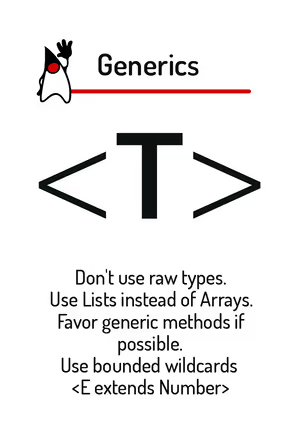Generics

Generics are your safety net in Java. They let the compiler enforce type safety at compile time, so you don’t get ClassCastException at runtime. Never use raw types. Always parameterize collections and methods. Prefer List<E> over arrays because lists are flexible, type-safe, and work smoothly with the Collections API.
The real benefit comes when all items in a list share a type. For example, imagine a Burger hierarchy:
class Burger { void cook() { System.out.println("Cooking burger"); } }
class Cheeseburger extends Burger { void addCheese() { System.out.println("Adding cheese"); } }A generic method can handle any kind of burger safely:
public static <T extends Burger> void cookAll(List<T> burgers) {
for (T burger : burgers) {
burger.cook(); // safe: compiler knows every item is a Burger
}
}Now you can do:
List<Cheeseburger> cheeseburgers = List.of(new Cheeseburger(), new Cheeseburger());
cookAll(cheeseburgers); // guaranteed safe
List<Burger> burgers = List.of(new Burger(), new Burger());
cookAll(burgers); // also safeWithout generics, you’d need raw lists and unsafe casts:
List rawList = new ArrayList();
rawList.add(new Cheeseburger());
for (Object b : rawList) {
((Burger) b).cook(); // unsafe, runtime errors possible
}Rules for every commit:
-
Avoid raw types:
List list→List<Burger> list -
Prefer
Listover arrays for safety and flexibility -
Use bounded wildcards
<T extends Burger>for reusable methods -
Keep collections type-consistent so the compiler protects you from mistakes
Generics are more than syntax - they make your code predictable, safe, and maintainable. When all items share a type, you can operate on them confidently without unsafe casts.